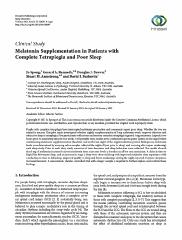Please use this identifier to cite or link to this item:
https://ahro.austin.org.au/austinjspui/handle/1/11791Full metadata record
| DC Field | Value | Language |
|---|---|---|
| dc.contributor.author | Spong, Jo | en |
| dc.contributor.author | Kennedy, Gerard A | en |
| dc.contributor.author | Brown, Douglas J | en |
| dc.contributor.author | Armstrong, Stuart M | en |
| dc.contributor.author | Berlowitz, David J | en |
| dc.date.accessioned | 2015-05-16T01:25:09Z | |
| dc.date.available | 2015-05-16T01:25:09Z | |
| dc.date.issued | 2013-03-12 | en |
| dc.identifier.citation | Sleep Disorders 2013; 2013(): 128197 | en |
| dc.identifier.govdoc | 23766913 | en |
| dc.identifier.other | PUBMED | en |
| dc.identifier.uri | https://ahro.austin.org.au/austinjspui/handle/1/11791 | en |
| dc.description.abstract | People with complete tetraplegia have interrupted melatonin production and commonly report poor sleep. Whether the two are related is unclear. This pilot study investigated whether nightly supplementation of 3 mg melatonin would improve objective and subjective sleep in tetraplegia. Five participants with motor and sensory complete tetraplegia ingested 3 mg melatonin (capsule) two hours prior to usual sleep time for two weeks. Full portable sleep studies were conducted in participants' homes on the night before commencing melatonin supplementation (baseline) and on the last night of the supplementation period. Endogenous melatonin levels were determined by assaying saliva samples collected the night of (just prior to sleep) and morning after (upon awakening) each sleep study. Prior to each sleep study measures of state sleepiness and sleep behaviour were collected. The results showed that 3 mg of melatonin increased salivary melatonin from near zero levels at baseline in all but one participant. A delay in time to Rapid Eye Movement sleep, and an increase in stage 2 sleep were observed along with improved subjective sleep experience with a reduction in time to fall asleep, improved quality of sleep and fewer awakenings during the night reported. Daytime sleepiness increased however. A randomised, placebo controlled trial with a larger sample is required to further explore and confirm these findings. | en |
| dc.language.iso | en | en |
| dc.title | Melatonin supplementation in patients with complete tetraplegia and poor sleep. | en |
| dc.type | Journal Article | en |
| dc.identifier.journaltitle | Sleep disorders | en |
| dc.identifier.affiliation | Institute for Breathing and Sleep, Austin Hospital, Heidelberg, VIC 3084, Australia | en |
| dc.identifier.doi | 10.1155/2013/128197 | en |
| dc.description.pages | 128197 | en |
| dc.relation.url | https://pubmed.ncbi.nlm.nih.gov/23766913 | en |
| dc.type.austin | Journal Article | en |
| local.name.researcher | Berlowitz, David J | |
| item.languageiso639-1 | en | - |
| item.fulltext | With Fulltext | - |
| item.grantfulltext | open | - |
| item.openairecristype | http://purl.org/coar/resource_type/c_18cf | - |
| item.cerifentitytype | Publications | - |
| item.openairetype | Journal Article | - |
| crisitem.author.dept | Respiratory and Sleep Medicine | - |
| crisitem.author.dept | Institute for Breathing and Sleep | - |
| crisitem.author.dept | Physiotherapy | - |
| crisitem.author.dept | Institute for Breathing and Sleep | - |
| crisitem.author.dept | Data Analytics Research and Evaluation (DARE) Centre | - |
| Appears in Collections: | Journal articles | |
Files in This Item:
| File | Description | Size | Format | |
|---|---|---|---|---|
| 23766913.pdf | 1.32 MB | Adobe PDF |  View/Open |
Page view(s)
44
checked on Dec 26, 2024
Download(s)
104
checked on Dec 26, 2024
Google ScholarTM
Check
Items in AHRO are protected by copyright, with all rights reserved, unless otherwise indicated.
